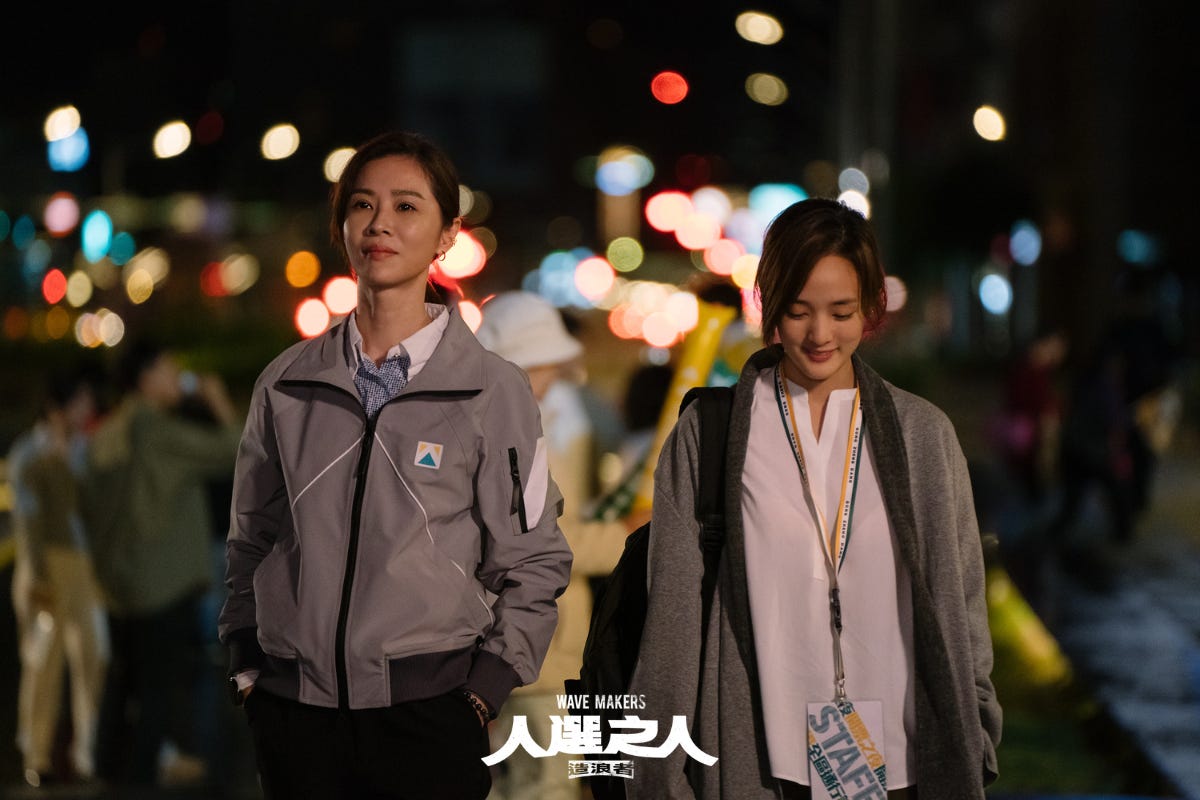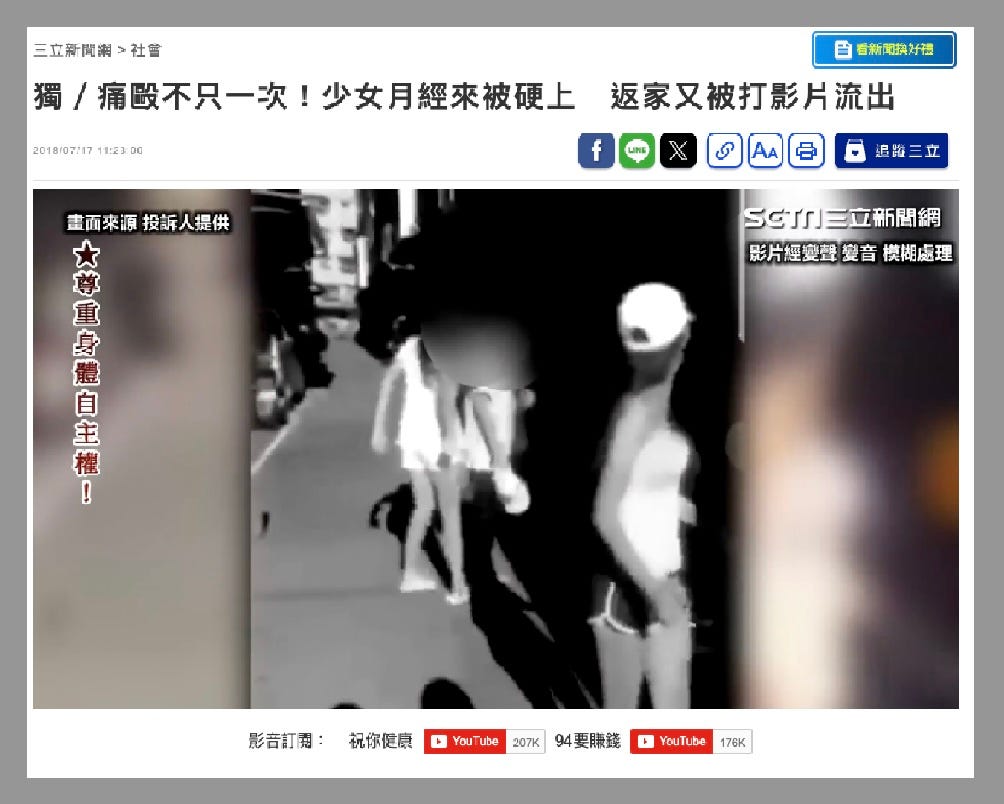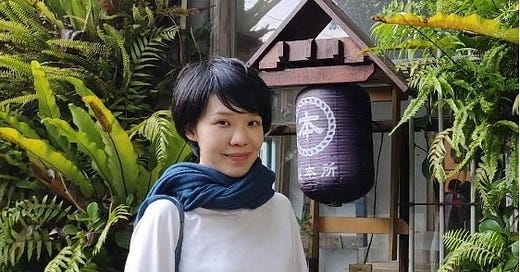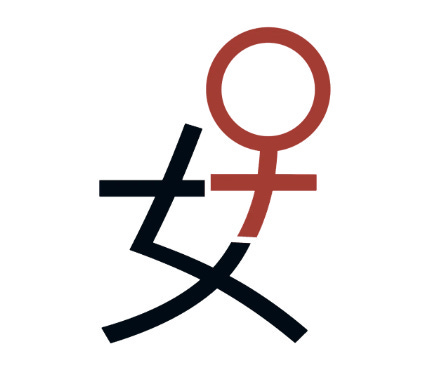Survival Beyond Silence
How does a journalist's personal experience with harassment influence their reporting? Chen Hung-Chin shares insights from both sides of Taiwan's gender equality struggles in media.
This special edition of "Intersections" offers a full translation of an interview by our companion publication Tian Jian (田間) of journalist Chen Hung-Chin (陳虹瑾). A survivor herself of gender-based violence in the workplace, Hung has experienced these issues as both a journalist and a defendant. In this candid conversation, she shares insights on workplace harassment in Taiwan's media industry, the challenges of speaking out, and how the #MeToo movement has changed professional dynamics.
Currently a lead writer for the Features and Profiles section at Mirror Media (鏡周刊), Hung graduated from National Taiwan Normal University's Department of Social Education with a focus in journalism and holds a master's degree in Asian Politics from SOAS University of London. She previously worked at Initium Media and at Taiwan's Central News Agency (CNA).
For more great coverage of journalism and media in the Chinese-language space, sign up for your free subscription to Tian Jian. Hung’s reports at Mirror Media can be found here. But don’t miss our selection of her recent reporting on gender-based violence at the end of this interview.
Tian Jian: What are the main gender issues in the industry? Is there a possibility to overcome or solve them?
Chen Hung-Chin: I started working in journalism in 2009, but my career path changed in 2011 because of an incident that few people know about. While covering city council news in Taiwan, I experienced sexual harassment from a senior colleague, a well-known figure in the industry, at my workplace. I was 23 at the time and didn't know how to react or talk about it, so I wanted to resign. Fortunately, our deputy general manager didn't want me to leave the company, so he offered me a position on the cross-strait relations team where there was an opening. I had the opportunity to switch positions and began covering cross-strait news.
I've only recently become comfortable discussing this, as I realized I had processed what happened, and it no longer causes me as much pain. This was before the MeToo movement. I'm speaking up now about my experience at 23 because it happened again later. While stationed in China, covering cross-strait relations, I didn't file a formal complaint at that time.
When the perpetrator harassed me again with a phone call, I recorded it and sent it to some of my colleagues in Taipei. I told them to inform his superiors that the recording would go public if he called again. This was the only way I could handle it, especially in that environment. As the youngest reporter, I knew people expected me to comply (應該服從). Given my age, and because I was a young woman, I shouldn't talk back. When dealing with some Taiwanese businessmen, I saw colleagues being inappropriately touched, and they would just avoid it. Everyone seemed to know we needed to be careful to avoid being taken advantage of — but most felt it was part of the job. I don't remember seeing anyone confront their harassers directly.
One time, a Taiwanese businessman wanted to exchange business cards with me and asked, "Should I refer to you as 'miss,' or should I call you 'miss'?" I slammed my cup on the table and loudly asked him, "What do you mean?" The public relations person came over, and the businessman still wanted my card. Even though my card was right there on the table, I told him I didn't have one with me. In that situation this was my only way to protect myself. [NOTE: The businessman's second reference to "miss" intimated the role of a paid drinking partner, as in a nightclub].
After graduating from university, I joined CNA (Central News Agency), and throughout my studies I had never imagined that these things [like sexual harassment] would be so close to me.
After a few years, I began to think and feel that the issue was not over, as the harasser continued to harass me when I returned. It was his way of showing off his power. Later, when Initium Media (端傳媒) was looking for office space, a colleague warned me to be careful because the harasser had taken a photo of the door of my potential office and sent it to some reporters, saying that Initium Media was behind this door.

One time, I was alone in the elevator with many people around when the harasser walked out. I pretended not to see him. But after everyone else had exited, he stopped the door and asked me, "When are you going to open the office formally?" I wrote a social media post about this but could not use his name because I wasn't sure if the elevator had a camera. Later, a supervisor from my former company called and asked if I left that company because of this person. "Yes," I said.
To some extent, my powerful reactions sadly became what kept me safe. To answer your question, I have to say that as long as these types of people exist, these situations [sexual harassment] will always exist. It's just a question of how brazen these people dare to be in their harassment. The threshold has been raised, including the possibility of them paying a price. The overall situation hasn't reached a point where there are immediate and clear consequences [for perpetrators], but the number of cases where harassers eventually face consequences has increased.
Tian Jian: Have journalists and media played the role they need to play in the MeToo movement?
Chen: I believe there will be some changes, and of course, there will also be consequences for women — and even some backlash and blowback. For example, in the US or Korea, after the MeToo movement, some male managers completely cut off promotion opportunities for female middle managers or refused to travel with female managers, thinking "If I avoid interacting with you, there can't be harassment" — which is actually a setback for gender equality.
As for whether the media has played its role and achieved the expected effect, I think reporting on these issues will make potential perpetrators aware that they might have to pay a price, and that price might affect their work. I think potential harassers now realize that their actions will have consequences.

I've written several reports on the MeToo movement and found that many patterns are strikingly familiar. You speak out, and then you receive a summons. I was actually sued, had to go to court, and then the case was dropped. But few people know that after the case is dismissed, it's not over because the other party can appeal the dismissal.
In the long run, it's not a clean, decisive resolution. I think what we're going through now are growing pains.
Tian Jian: Has speaking out impacted your career?
Chen: I think it will have some impact, though perhaps not so directly. When I was younger, reporting harassment wasn't even an option for me, because I was so worried about how it might affect my work. Now, people understand what kind of person I am, and they take that into consideration.
After I took a clear stance, these incidents happened less often. Some of my male colleagues would jokingly say to one another, "Hey, didn't you see what happened to that harasser?" They would joke around like that [making light of a serious situation]. But for me personally, it eliminated a great deal of trouble.
Tian Jian: How do female colleagues in the industry respond when they encounter discrimination and harassment in the workplace?
Chen: You need to gather evidence and be ready. Both are very important.
When I was younger, reporting harassment wasn't even an option for me, because I was so worried about how it might affect my work.
I recently interviewed Shiori Ito, and she mentions a concept that goes beyond gender: if you don't feel safe enough to speak up, then don't.
If a 23-year-old me faced this situation today, I still wouldn't dare to file a gender equality complaint. When looking back at my 15 year-long career, I see it as a long process of empowerment and deciding whether I am willing to pay the price.
Tian Jian: Does the media now have a complete gender equality complaint system?
Chen: On paper, there is a system. At one company I worked at, there was a gender equality committee. When someone reported a harassment incident, the committee would call in the harasser and ask if it had happened. The harasser admitted it, so the committee naturally found him guilty. However, at the administrative level, there are still some gray areas.
The system currently in place is the most comprehensive we've ever had, but there will be many distortions after the whole procedure ends.
For example, in the case I mentioned before, because the harasser had been working in the company for a long time, they might restore his performance rating the next year, and in the end, he still gets to happily collect his retirement benefits.
Tian Jian: What factors prevent the industry from making these mechanisms truly fulfill their intended purpose?
Chen: I think the intentions of those in power are very important, and then there's whether regulations are enforced - that's the top-down approach. The bottom-up approach is similar to unions, where we need to demand these changes ourselves.
Tian Jian: What can male colleagues do to improve gender equality awareness in the industry?
Chen: Men don't know how to act. I think an important concept to grasp is the difference between "significant others" and "bystanders." Many people see themselves as bystanders.
Biological males have enjoyed gender inequality for a long time, so they don't understand the urgency of the matter. For those who are not perpetrators, they are in an overwhelmed state: "What should I do now?"; "Is it okay if I say this?" We need more communication, dialogue and understanding.
Tian Jian: Does having more female executives in the industry improve the environment?
Chen: I can only say I've seen people who compromised, those who refused to compromise, and those who were forced to compromise within power structures but became more willing to protect others once they gained power themselves.
Tian Jian: What are the biggest mistakes the media makes when covering these issues? Is there a space for improvement?
Chen: The headline I hate the most (about abuse or harassment news) is "was taken by force" (被硬上). I think that using the verb "take" in this context is very deceptive, even malicious. Because technically, it is not a bad word, it seems acceptable for headlines. I see many content farms using it. It's really walking a fine line.

I've noticed another issue - news organizations want traffic, so some describe details extensively. Many interviewees are articulate and include detailed memories, which news organizations quote directly. Are these quotes appropriate? I think it depends on whether the survivor wants to be described or quoted that way.
Tian Jian: Why do you extensively write about these issues?
Chen: Looking back, I think non-fiction writers all have their main topics of focus. The things that happened to me seem to remind me to pay attention to these issues. I don't thank these incidents (of sexual harassment), but as a woman, I understand what power-based sexual harassment is. When I can handle it, I feel obligated to speak up.
Tian Jian: When interviewing victims of sexual crimes, what should you keep in mind? How do you cope when hearing these stories?
Chen: The most important things are informed consent and clarity about how their story will be presented and in what context. Also keep your word — saying something like, "For this call, I'll only write about it after you give the OK."
So I always thought I wasn't important — that what really mattered most was getting the story out there. But I'm slowly realizing that this is wrong.
Many people ask me how I cope, and I am embarrassed because my answer is superficial. I handle it in very basic ways. When I started as a wire service reporter, writing many stories every day, I didn't have time to cope with my emotions. With vicarious trauma, you don't have time to process it — you just push it down through willpower.
My superficial approach during the Hong Kong protests was to watch completely unrelated live streams after finishing a series of reports — Korean dramas or Korean sellers' live streams. I'd use totally unrelated content to wash away the bad feelings, though some things definitely need proper processing later. I feel like those experiences are always there, constantly present.
Tian Jian: What advice do you have for people who want to become journalists or freelancers covering gender issues?
Chen: I think my suggestions probably aren’t sufficiently helpful. One thing I am still learning is that my own feelings are important too. I studied journalism in college and I think I'm still a bit too academic, or I've held the belief that news is more important than the individual. So I feel that my time, feelings, and life can all be sacrificed. I've seen many senior colleagues survive this way, especially women. So I always thought I wasn't important — that what really mattered most was getting the story out there. But I'm slowly realizing that this is wrong.
Always think several steps ahead for your interviewees, and remember that you matter too. After covering sexual violence stories, take time to process it, before moving to your next interview. I haven't done this well. I typically use professionalism to push down emotions and trauma. I am still learning after all.
"Let Malice Subside: A Conversation on Institutional Sexual Violence, Media, and Legal Battles: Zhou Yi-pei and Wu Zi-ying" ([一鏡到底]讓惡意收斂吧 走過權勢性暴力的輿論與法律戰爭 周宜霈、吳姿瑩對談) | Mirror Media | July 15, 2024
"The Person Who Cannot Sleep on Their Back: Wang Jing-han and Her Family's 20 Years After Sexual Assault" ([鏡相人間]無法仰睡的人 性侵案後王瀞韓與家人的20年) | Mirror Media | December 12, 2023
"I Won't Let You Be Alone: Actress Mia's Survival Journey After Speaking Out and Getting Sued in the #MeToo Movement" ([鏡相人間]我不願讓妳一個人——#MeToo發聲反挨告 女演員Mia的倖存之路) | Mirror Media | October 13, 2024







